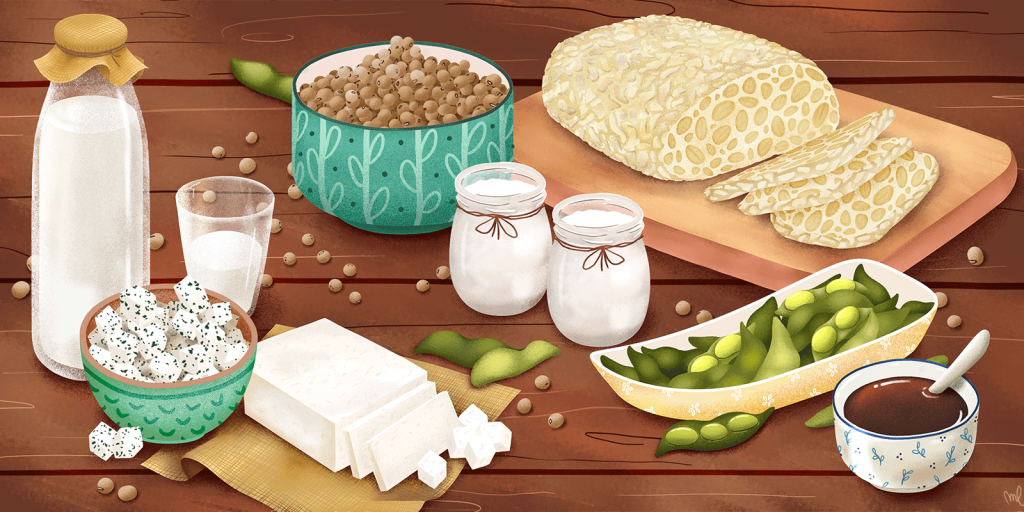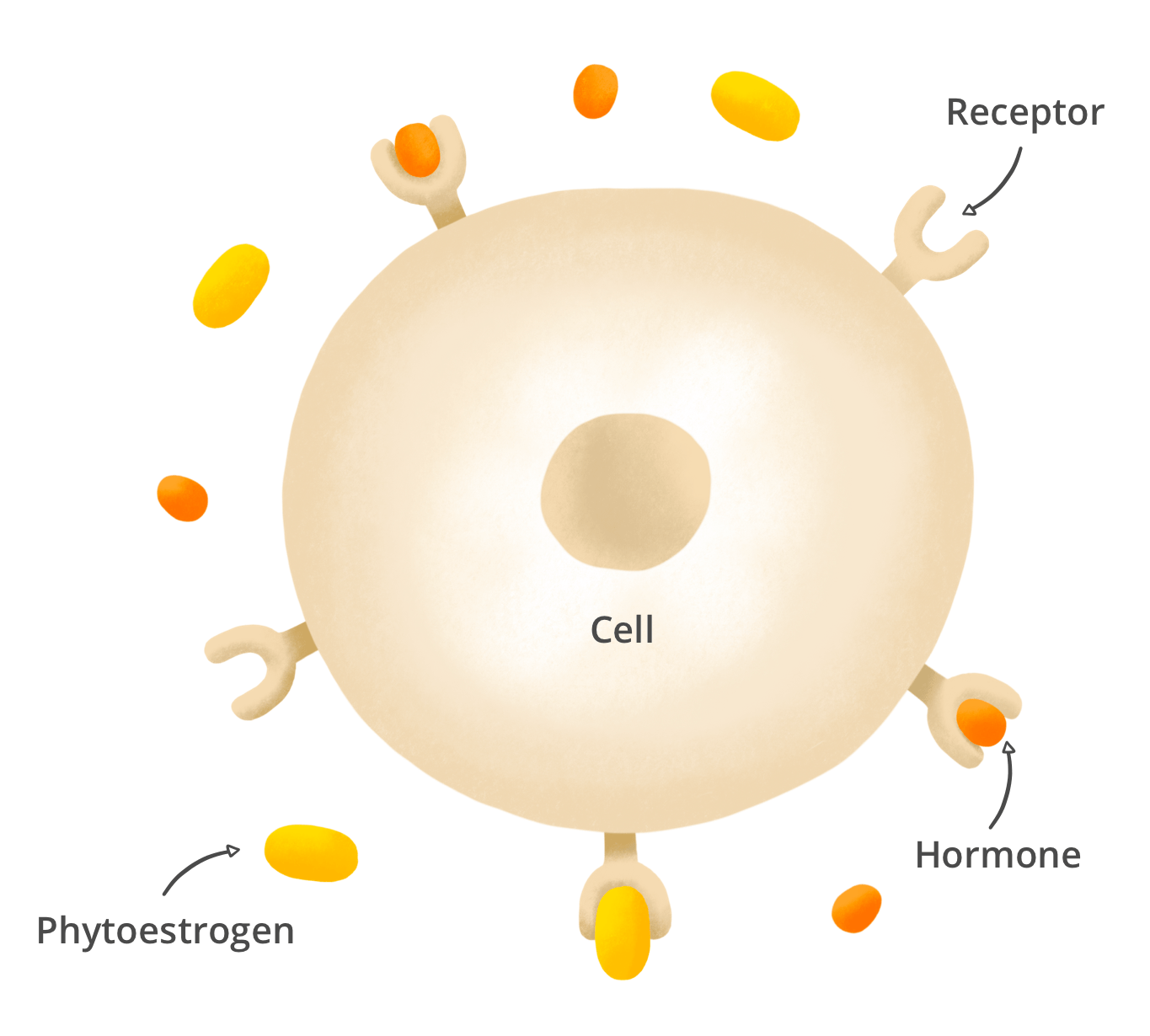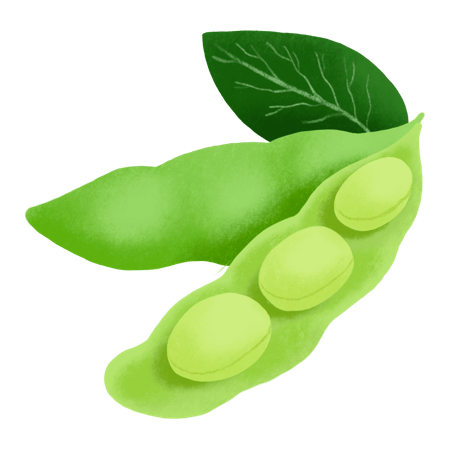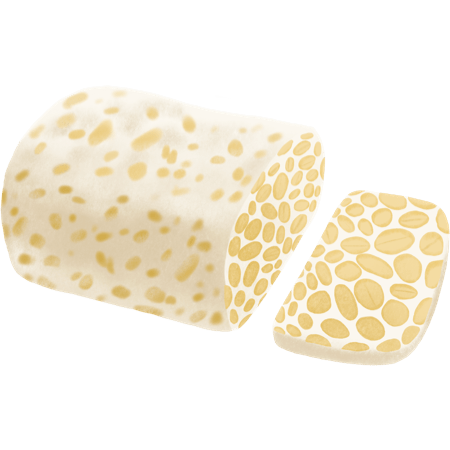
At a time when scaling back our beef consumption is both an environmental and health imperative, soybean consumption is booming.
Soybeans are legumes, meaning that they belong to the family as lentils, beans and peas. Today we consume it in a wide variety of forms: beans, sprouts, oil, tofu, yogurt, milk, flour and fermented paste.
But what are its benefits and are there any risks associated with over-consumption? Here we shed some light on soy, with the help of nutritionist Anthony Berthou.
A good source of plant protein
Soy is very rich in high-quality plant protein (see our post on proteins), which makes it a go-to food for vegetarians and vegans. Soy protein contains the essential amino acids in rather good proportions, and they are very easy to digest.
But it is important to know that the protein content in soy varies depending on its form. Here are the protein volumes for 100 g of product:
- Soy flour: 45g
- Tempeh: 19g
- Tofu: 12g
- Miso: 12g
- Cooked soybeans: 12g
- Soy yogurt: 5g
- Soy beverage: 4g
Soy and hormones
Soy contains substances from the phytoestrogen family that can interact with female hormones (estrogens). Naturally, these hormones are mainly found in women, but they also occur in men in much lower quantities. These phytoestrogens can come into competition with our own estrogens by binding to some of their receptors. This is why there is much discussion about the effects of soy.

The first thing to know is that the quality of the intestinal microbiome will have a major impact on the effect of phytoestrogens. When healthy, our gut flora convert phytoestrogens into equol, a more active molecule. Thus, the impact of soy is dependent on the microbiome’s ability to convert phytoestrogens into equol, which may explain the disparate effects observed in different people. It is thought that only 25% to 60% of the population have the bacteria needed to synthesize equol.
As a result, phytoestrogens may have different health benefits. In particular, they may play a role in preventing hormone-dependent cancers, especially breast cancer. On the other hand, in women who already have breast cancer, some studies suggest that phytoestrogens may contribute to the proliferation of cancer cells.
Phytoestrogens may also lower the risk of cardiovascular diseases. And they may have a beneficial effect on osteoporosis and encourage proper gene expression.
The discussions around soy have not been settled. As of now, the studies are controversial and further research is necessary.
What about soy’s environmental impact?
Today, soybean farming is responsible for a large share of the deforestation of the Amazon in Brazil. Consider that the land area devoted to soy farming expanded from fewer than 30 million hectares in 1970 to over 100 million hectares today (Agralytica, 2012).
Moreover, soybean crops rely heavily on pesticides, particularly glyphosate, whose toxicity is widely criticized. These pesticides contaminate the soil and rivers and lead to health problems for the local population. Finally, the majority of the world’s soybean production – and especially Brazil’s soybean output– comes from GMOs, whose long-term effects on the ecosystem are still unknown.
Faced with this situation, it is important to know that a significant percentage of the world’s soybeans are used for animal feed, via the production of soy meal. That means that we consume soy indirectly when we eat meat.
The food processing industry is also responsible for the environmental impact of soybeans. Indeed, soybean oil is used in many processed foods (ready-made meals, sauces, cookies, etc.) because of its low cost. Here again, it is a good practice to carefully read the list of ingredients to avoid products that contain soybean oil.
It is not the consumption of soy in and of itself that is problematic, but rather its massive use in animal feed and in the agri-business industry in many processed foods.
Bottom line: what should you do?
There are several studies today that show there are health benefits from consuming soy in moderation. This holds true when soy is consumed as food– especially fermented products (e.g., tempeh, miso) – and not in the form of dietary supplements.
Although the evidence is still not sufficiently clear, it is still advisable to exercise caution as we await further research.
 | 1) Limit your soy consumption to three to seven products per week. It is also recommended to limit the consumption of these products by young children – especially boys – and by pregnant or nursing women. Given the small quantities consumed per serving, soy sauce is not included in this restriction. |
 | 2) Consume soy in its natural forms. In particular, avoid consuming soybeans in the form of dietary supplements made from phytoestrogens. |
 | 3) Prioritize fermented soy products (e.g., miso, tempeh). Fermentation optimizes the effects of soy by reducing the presence of compounds that lower the absorption of nutrients in the digestive system. Fermentation also helps the microbiome to better metabolize the active forms of soy (equol). |
 | 4) Choose organic soybeans that are grown locally. The environmental consequences of soybean farming in Brazil are disastrous, and it is important to prioritize local consumption. You should note, however, that organic products can have up to 0.9% GMO. |
- Ingram D, Sanders K, Kolybaba M, Lopez D. Case-control study of phyto-oestrogens and breast cancer. Lancet. 1997;350(9083):990-994.
- Taku K, Umegaki K, Sato Y, Taki Y, Endoh K, Watanabe S. Soy isoflavones lower serum total and LDL cholesterol in humans: a meta-analysis of 11 randomized controlled trials [published correction appears in Am J Clin Nutr. 2007 Sep;86(3):809]. Am J Clin Nutr. 2007;85(4):1148-1156.
- Wei P, Liu M, Chen Y, Chen DC. Systematic review of soy isoflavone supplements on osteoporosis in women. Asian Pac J Trop Med. 2012;5(3):243-248.
- Gil-Izquierdo A, Penalvo JL, Gil JI, et al. Soy isoflavones and cardiovascular disease epidemiological, clinical and -omics perspectives. Curr Pharm Biotechnol. 2012;13(5):624-631.
- Frankenfeld, C. L., C. Atkinson, K. Wähälä, et J. W. Lampe. « Obesity Prevalence in Relation to Gut Microbial Environments Capable of Producing Equol or O-Desmethylangolensin from the Isoflavone Daidzein ». European Journal of Clinical Nutrition 68, no 4 (avril 2014): 526‑30.
- Anses - Sécurité et bénéfices des phyto-estrogènes apportés par l'alimentation - Recommendations : https://www.anses.fr/fr/system/files/NUT-Ra-Phytoestrogenes.pdf
- The Nature Conservancy - An overview of the Brazil-China soybean trade and its strategic implications for conservations : https://www.fcrn.org.uk/sites/default/files/brazil-china-soybean-trade.pdf
- WWF - https://wwf.be/fr/actualites/deforestation-importee-le-role-du-soja-dans-lalimentation-animale-et-les-effets-sur-la-biodiversite-en-amerique-latine/
- Soy Barometer 2014, A Research report for the Dutch Soy Coalition, Profundo Research and Advice, September 2014
- https://www.bothends.org/uploaded_files/document/Soy_Barometer2014_ENG.pdf)
- https://eatforum.org/content/uploads/2019/01/EAT-Lancet_Commission_Summary_Report.pdf






Great article. Had no idea soy products were sourced from Brazil and sprayed with evil Bayer/Monsanto Roundup.
Should I switch to SOY milk from Almond milk ? Which is healthier? I also read that Soy is high in the super nutrient SPERMADINE..Any suggestions would be appreciated…
I had a doctor when I lived in Vancouver who was both a medical doctor and a Naturopath. Soy was absolutely not to be eaten if you had a thyroid problem as he said it made hypothyroidism worse. You could only have it if it was fermented. So I quit having soy products and my life improved substantially.
Thanks for all you input. I am loving the app and share it my friends. My husband is in arid with making better choices.